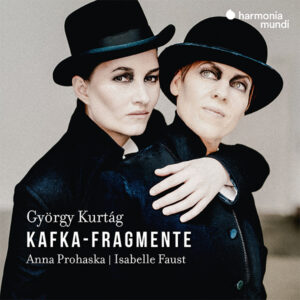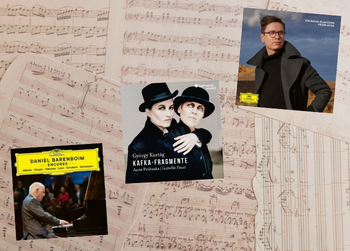In the aesthetics of Romanticism, the notion of the ‘fragment’ – a piece of art, poetry, or music left ‘unfinished’ (whether deliberately or not) – was studied and cultivated by philosophers and aphorists. Shards pottery of ancient civilisations, unearthed by budding archaeologists, lightning-damaged oak trees, ruins, or poetry left incomplete by the death (or boredom) of its creator were all grist to the interpretative mill of the aesthetically-minded. Critic and philosopher Friedrich Schlegel (1772-1829) declared that ‘a fragment, like a small work of art, has to be entirely isolated from the surrounding world, and be complete in itself, like a hedgehog.’ The fragment should be considered in relation to other fragments, requiring a sense of wit and irony to be understood.
Some musicians, notably Robert Schumann, actively engaged with the creation of ‘fragments’ and short incidental piano works (preludes, nocturnes, impromptus, intermezzi, caprices, variations) exemplify these forms. Four recent additions to our classical CD collection, performed by a variety of eminent artists, include music that epitomizes the Romantic fragment: short pieces that may, or may not, be part of larger works, but which also exist autonomously, short poems in musical form.
Encores
Recorded in Berlin’s Pierre Boulez Saal, a hall with which Daniel Barenboim has an especially close connection, this CD of short pieces by Schubert, Albeniz, Liszt, Schumann, Chopin, and Albéniz is also highly personal. Each work offers an exquisite portrait in miniature of Barenboim’s artistry, and a reflection upon his extraordinary career. The four extracts from Schumann’s Op. 12 Fantasiestücke are exceptionally fine, exemplifying Barenboim’s inimitable understanding of this enigmatic composer.
Romantic piano masters
The title of Georgian pianist Mariam Batashvili’s new album suggests a cornucopia of popular classics, or even old chestnuts, but instead offers some surprises. Batashvili presents Franck’s Op. 18 Prélude, Fugue et Variation – a piece conceived for organ, and dedicated to Saint-Saëns – which she executes with grandeur and panache, emphasising the composer’s homage to J.S. Bach. Then she moves into theatrical territory, exploring the Romantic tradition of transcription, the practice of re-imagining for the piano – often in the most virtuosic manner – other composers’ music. Liszt’s transcriptions of songs by Schubert, and his fantastical interpretation of the waltz from Gounoud’s Faust, sit alongside the extraordinary Grande Caprice on motifs from Bellini’s La Sonnambula by Sigismond Thalberg. This juxtaposition of composer-pianists is a witty one, given their famous rivalry as both men strove to be the most famous pianists in Europe.
From afar
Ólafsson’s From afar presents the listener with ‘a window into his musical life story‘ that also hints strongly at the legacy of the Romantic fragment: alongside an Intermezzo by Brahms and extracts from Schumann’s Waldszenen and Kinderszenen, Ólafsson includes his own arrangements of music by Mozart and Bach. In stark contrast is the presence of Bartók’s Three Hungarian Folksongs from the Csík District, and a selection of short pieces by another Hungarian, György Kurtág. While not of the ‘Romantic’ era,, these pieces are also fragmentary but, like Schlegel’s hedgehog, complete in themselves. Ólafsson includes performances of these pieces on both a concert grand piano and on an upright, suggesting the piano upon which Ólafsson practised as a child. This evocation of memory and perhaps even yearning for the past is diverting, is a beguiling but sometimes rather contrived concept. The quality of Ólafsson’s musicianship is, however, superb.
Kafka-fragmente / Kurtág, György  The song cycle is a genre most readily associated with the nineteenth century, but Kurtág’s song cycle Kafka-fragmente (Kafka Fragments) is an extraordinary approach to the form dating from the mid-1980s. Kurtág built the cycle for soprano and violin around forty tiny fragments of text from Franz Kafka’s personal writing, letters, diaries, filled with paradoxes and cryptic vignettes. Often the text for a song is just one short, unfinished sentence, or (in the case of the nineteenth song in the cycle) just two words, ‘Nichts dergleichen’ (‘nothing of the kind’). Every listener can form their own interpretation of each fragment. The virtuosity of soprano Anna Prohaska and violinist Isabelle Faust is unsurpassed here. Two entirely equal partners, they surmount every one of Kurtág’s challenges with acerbic wit and sincere expression.
The song cycle is a genre most readily associated with the nineteenth century, but Kurtág’s song cycle Kafka-fragmente (Kafka Fragments) is an extraordinary approach to the form dating from the mid-1980s. Kurtág built the cycle for soprano and violin around forty tiny fragments of text from Franz Kafka’s personal writing, letters, diaries, filled with paradoxes and cryptic vignettes. Often the text for a song is just one short, unfinished sentence, or (in the case of the nineteenth song in the cycle) just two words, ‘Nichts dergleichen’ (‘nothing of the kind’). Every listener can form their own interpretation of each fragment. The virtuosity of soprano Anna Prohaska and violinist Isabelle Faust is unsurpassed here. Two entirely equal partners, they surmount every one of Kurtág’s challenges with acerbic wit and sincere expression.


